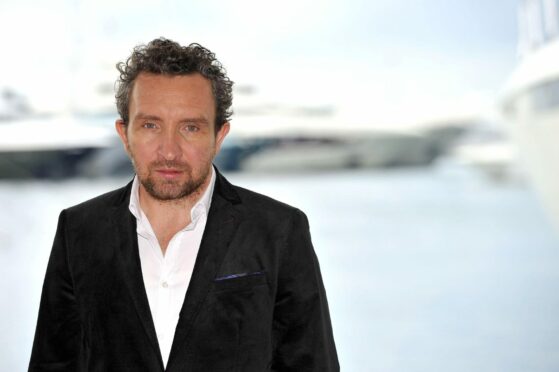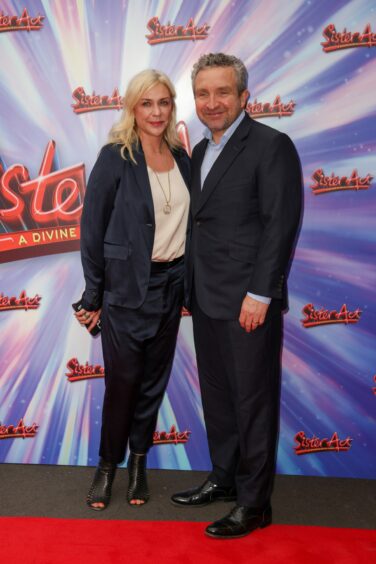
Eddie Marsan is listing his upcoming projects, of which there are many. So many, in fact, he eventually has to give up.
“I’m doing a thing at the moment with Michael Douglas who is playing Benjamin Franklin and I’m playing John Adams; then there’s The Power, which is a series for Amazon; and an American movie called Fair Play; and a movie with Jude Law where he plays Henry VIII,” he says. “There’s loads of things and, to be honest, I lose track. I’m a workaholic.”
Those he omits to mention include Emperor, in which he plays Martin Luther, and Midas Man, playing the father of Beatles manager Brian Epstein. With more than 140 screen credits in 30 years, he can be forgiven for failing to mention all of them.
The distinctive-looking Londoner, with his mop of curly hair, piercing green eyes and stocky build, has become one of the most in-demand character actors in the business. He’s appeared alongside some of the biggest stars in the world such as Will Smith and Tom Cruise, and worked with the best directors including Steven Spielberg and Martin Scorsese. And he’s played everything from a driving instructor with anger management issues in Happy-Go-Lucky to death-hoaxing insurance fraudster John Darwin in The Thief, His Wife And The Canoe.
His latest is the acclaimed sci-fi film Vesper, out later this month.
But Marsan says he has had to fight hard to avoid being typecast after seeing the writing on the wall in his early days as an actor.
“When I was younger, because of where I came from, I was always being asked to play muggers or drug dealers or racists of one kind or another,” explains Marsan, who grew up in an East London tower block. “I realised early on that I could either be a professional caricature or a professional actor and I decided I wanted to be an actor, so one of the things I decided to do as much as possible was the next role had to be completely different from what I had just done, so that I could change people’s idea of me.
“If they had a preconceived idea of me based on my class and culture, I had to challenge that. I couldn’t wait for them to change their minds. I’ve done that for the last 20 years and I enjoy it now because there’s a great diversity of roles that come in, and I love that people don’t really have an idea of me in a sense.
“No one can go and see an Eddie Marsan film and know what they are going to get. I’m not really charismatic. Some actors are; you go and see them and know what you are going to get and have a great deal of admiration or affection for them. People don’t have that with me. People are either repelled by me or… well, mainly repelled by me.”
The Ridley Road and Sherlock Holmes actor points to 2003 as a turning point in his career.
He says: “I’d done 21 Grams in America and Vera Drake in London and both of them came out in the same year and received Oscar attention. I played two nice characters in both of those films – an American baptist preacher and a working-class labourer – and suddenly I found I had a career as an actor in both countries at the same time and with two very different ideas of me, and I purposefully cultivated that as much as possible.
“One year I played Heinrich Himmler and the next role I had was Bob Dylan. That’s what I always try to do.”
Marsan, 54, had a troubled upbringing but he remains proud of his roots – and connected to them, too. The dad of four, who was a printer before discovering a passion for acting, is outspoken on social media about issues he believes in.
“I’ve always spoken about things before I was an actor,” he continues. “I grew up on a council estate and I was very close to a St Lucian family. When my own family life was difficult, this family offered me refuge, support and love, and at the same time their windows were being smashed by BNP and National Front supporters. In Tower Hamlets, although there was mass immigration, within the white working class you also had lots of racism.
“That angered me as a young man and I would speak about it as a printer. If social media had been around then, I would have been on it just as much because I hated those people. The people who gave me a lot of love and support were being abused so whenever I see anything like anti-Semitism, I would have said something even if I wasn’t famous.
“The fact I’m famous doesn’t mean I can’t say something; I’m going to speak about it as much as anyone else. If you are being racist or abusive to people I grew up with or work with, people I love, I will call you out.
“One of the things I’ve realised as I get older is lots of people show me affection because of who they think I am now – a famous actor – and it really makes you appreciate those who loved you when there was nothing in it for them. They loved me when I was a kid or a printer or walking down the road. They loved me when I wasn’t famous, so my appreciation has grown tenfold for them since I’ve grown older.”
Despite his level of fame, Marsan is still able to enjoy a level of anonymity and says big celebrity would drive him mad.
“If you are in a soap or a long-running TV show, people identify you with that character and claim ownership,” he says. “We filmed Ray Donovan in New York and when we went back to do the film, I realised how much attention and affection people had towards my character Terry – and the whole family, actually. Usually I’m recognised as the guy who does many different things but when they recognise you as one particular character, they want to talk to that character. In New York, that happened to me for the first time.”
Marsan, who is married to renowned movie make-up artist Janine Schneider, was working in a menswear shop when he was asked to be an extra in a film, Empire State, in 1987. It made him realise it was a career he would like to pursue and his boss at the store offered to pay his drama school bills. It started him on the path that he continues to follow today, rubbing shoulders with some of the biggest names in film.
Those he gives special mention to include Sean Penn. He says: “I worked with him and was directed by him, which was a big ambition of mine, and I learned a lot.
“I did a couple of jobs with Philip Seymour Hoffman and we became friends. He was a big inspiration of mine.
“So, too, was Timothy Spall. And Paul Ritter, who I worked on Knockin’ On Dave’s Door with. He was one of my favourite actors. We left drama school at the same time and I was very aware of him, very inspired by him.
“I spent nine months on Gangs Of New York with Jim Broadbent and I learned a lot from him, as I did from Peter Mullan. One of those things being not to talk to him right before a take, because Peter can talk about anything, and when filming starts he’s immediately on the ball but I was stuffed because I was still thinking about his story!”
Marsan adds: “I hope I’ve not been pigeon-holed. There are many actors like me out there and they are not celebrated. A lot of actors who do that as a living. It’s what an actor is, really.”
A bigger budget doesn’t mean a better movie
A dystopian, post-apocalyptic world where the Earth’s ecosystem has collapsed is the setting for Marsan’s latest film, the critically acclaimed sci-fi tale, Vesper.
It follows the 13-year-old title character’s attempts to build a better life not just for herself but for what remains of the world in this bleak vision of the future. Marsan plays her Uncle Jospa, the leader of a cult who manipulates and controls those around him.
“Although it’s set in the future or somewhere far away, it’s a warning about the situation we are in now – about what could happen and the dilemmas we’re facing,” he says. “The environmental implications shown in Vesper are fascinating.
“Someone described my character as being Fagan-like – he has all these kids he seeks to be benevolent towards but he is actually abusing them in some way.”
Despite its eye-grabbing effects, Vesper is an independent film with a relatively small budget, and that was part of the attraction for Marsan.
“It’s one of the most visually stunning films I’ve ever been involved in and that was one of the reasons I was interested in doing it,” he continues. “The interesting thing about film-making is you don’t need studio backing – sometimes creativity comes from having limits and forces you to make a creative decision.
“Sometimes if you put £250 million in the budget, no one needs to make a decision because they can afford to sort it out later, and then you end up with a £250m bland film.
“Sometimes I’m offered big blockbusters and the part isn’t good or it’s something I’ve done before, so I choose not to do it. Sometimes the smaller, independent films are more creative and challenging, so I’ll do them.”
The film was shot in Lithuania during the pandemic, and stars teenager Raffiella Chapman in the title role.
“It was very strict guidelines on the film set and we’d go back to the hotel afterwards and there would be no restaurant open so we had to get the Lithuanian version of Deliveroo. I was there with Richard Brake, who plays Vesper’s dad, and he’s my best friend, so we’d sit and chat each night.
“Raffiella has a maturity as an actress that is quite remarkable. She is so understated. A lot of young actors try to force emotions and communication, but she does the opposite and conveys so much by doing so little and that shows a great competence as an actor. I was blown away by her – she’s going to be a big star.”
Vesper is available on demand and in cinemas from October 21

Enjoy the convenience of having The Sunday Post delivered as a digital ePaper straight to your smartphone, tablet or computer.
Subscribe for only £5.49 a month and enjoy all the benefits of the printed paper as a digital replica.
Subscribe © SYSTEM
© SYSTEM
